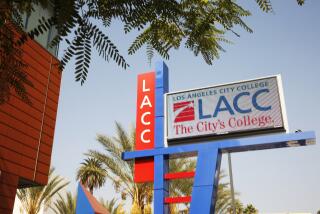Candidate Hits Sore Spot, Favors Chapman Growth
- Share via
Communications expert Allen E. Koenig, the apparent front-runner in Chapman College’s long search for a new president, said Friday that he wants the small private school to grow into “a medium-sized university”--a proposal certain to meet with protest from neighbors in Orange’s historic Old Towne community.
Chapman trustees will meet Wednesday to decide among three candidates, including the acting president, James Doti. Doti enjoys wide faculty support and is a respected local economist who is credited with instituting a long-range development plan and giving faculty a greater voice in college governance.
A decision, after months of speculation and an 11th-hour overhaul of the search process, would end nearly two years of interim leadership and growing frustration and uncertainty over the college’s direction.
Although trustee Les Duryea, a member of the search committee, declined Friday to say whether Koenig will be offered the post, Koenig made it sound virtually like a done deal. Koenig’s open candidacy is especially noteworthy because word that a college president is looking for a new job could cost him or her the old one.
Koenig, 50, now president of Emerson College in Boston, said that he has not been offered the Chapman presidency but that, if selected, he would “in all probability” accept.
“I’m meeting with the faculty and university community on Monday to list my goals for my first five years in office,” he said during a telephone interview from Boston. “I’m very favorably predisposed. I’m very impressed with the faculty, the facilities and the location. I’m also very favorable to California since I was born and raised in the state.”
Doti, a Chapman faculty member since 1974, said Friday that trustees have told him only that “the board will consider three active candidates” on Wednesday. “I remain one of those candidates.”
He declined to say whether he would remain at Chapman, where he is director of the Center for Economic Research and author of the annual Chapman Economic Forecast for Orange County, if the college’s top job goes to someone else. The identity of the third candidate could not be determined Friday.
“I would expect to make that decision after the appointment is made,” Doti said. Doti took over acting duties at Chapman months before the retirement of former President G.T (Buck) Smith in May, 1988.
One prominent staff member, who spoke on condition of anonymity, said opposition to Koenig is mounting because of his meager fund-raising record at Emerson and concerns about an Emerson College faculty “no-confidence” vote against him in April. Koenig attributed the vote to opposition to plans to move the scattered urban campus to a 78-acre site in Lawrence, Mass., by 1993.
“A lot of tenured faculty are ready to go to the mat for Doti,” the source said. “He’s one of them, he’s very respected and he’s brought a lot of visibility to the school.”
Chapman, which is preparing to launch a multimillion-dollar fund drive, received $4.1 million in gifts last year and has an endowment of $25 million. Gifts to Emerson, a liberal arts and communications college, totaled $600,000 in 1987-88, according to the Council on Aid to Education. In addition, Emerson College has a $4-million endowment and Boston real estate holdings that Koenig estimated are worth $100 million.
During his 10-year tenure as president of Emerson, Koenig said, he has worked to turn the college into “the MIT of communications.” In addition to degrees in mass communications, performing arts, writing and literature, the college plans to open a law school specializing in communication arts. The college, founded in 1880, has 2,500 students. Chapman’s current enrollment is 2,200.
Koenig declined to discuss his goals for Chapman in detail Friday, but said: “I’d like to see it become a medium-sized university. It’s already more a university than a college. . . . The institution could easily support 3,000 to 4,000 students, not entirely residential students.”
Growth has been a subject of contention between Chapman officials and community residents since 1986, when the college encountered fierce opposition to plans for a 67-foot high classroom tower. Plans for the building were later dropped, but the controversy was revived in May, when trustees announced a $23-million campaign to construct an academic building, a student union and a dormitory.
Chapman’s long-term development plan, approved earlier this year by the Orange City Council, allows construction but limits buildings to a height of 62 feet. In addition, the plan caps enrollment at 2,500 students.
Dale Rahn, president of the Old Towne Preservation Assn., reiterated his concerns that college construction must harmonize with the neighborhood of one- and two-story Victorian and early California-style houses.
He said the city-approved long-range plan effectively “clips their wings.” If Koenig is named president, Rahn said, “I think it is going to be critical for the community to meet with him very quickly to welcome him and address our concerns.”
More to Read
Sign up for Essential California
The most important California stories and recommendations in your inbox every morning.
You may occasionally receive promotional content from the Los Angeles Times.










